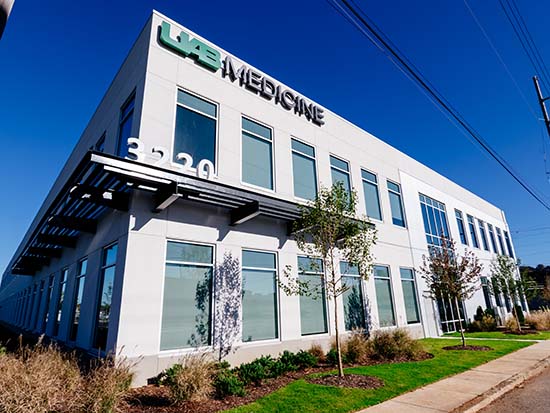Media contact: Anna Jones
UAB Eye Care This is the first time eye care will be provided on-site at the 1917 Clinic. , the clinical arm of the University of Alabama at Birmingham School of Optometry, will begin seeing patients in the 1917 Clinic beginning Feb. 14. The 1917 Clinic is the largest HIV health care unit in Alabama and one of the country’s leading HIV clinics. This is the first time eye care will be provided on-site at the clinic.
This is the first time eye care will be provided on-site at the 1917 Clinic. , the clinical arm of the University of Alabama at Birmingham School of Optometry, will begin seeing patients in the 1917 Clinic beginning Feb. 14. The 1917 Clinic is the largest HIV health care unit in Alabama and one of the country’s leading HIV clinics. This is the first time eye care will be provided on-site at the clinic.
“We have been seeing 1917 Clinic patients at UAB Eye Care on the UAB campus for some time now, but opening an eye clinic in the new 1917 Clinic space will provide patients with easier access to care and will allow more continuity of care,” said Andrew Rothstein, O.D., UAB Eye Care’s on-site attending optometrist.
HIV affects many parts of the body, including the eyes. It is estimated that 70 percent of people with AIDS experience eye problems, including HIV retinopathy and CMV retinitis. HIV retinopathy is the most common eye problem in people with HIV and is caused by the blockage of blood vessels in the retina. This blockage can lead to vision impairment or vision loss. CMV retinitis is a viral infection of the retina and is a leading cause of blindness in people with HIV.
Many eye conditions are asymptomatic in the early stages.
“This patient population is at risk for comorbidities such as hypertension and diabetes, and vision screenings can help detect these conditions,” Rothstein said. “Early detection and management of these diseases provide a much better prognosis than if they are caught later.”
Rothstein has a passion for community eye care and looks forward to serving patients at the 1917 Clinic.
“I was drawn to optometry by the tangible difference that eye care can make in patients’ lives,” he said. “It grieves me to know that there are people with treatable vision problems who do not receive care due to barriers such as lack of insurance or transportation. The way the 1917 Clinic has broken down many of these barriers is exciting, and I’m happy to be able to play a small part in that.”
Optometry students will join Rothstein at this location. In preparation for the 1917 Clinic rotation, they are required to undergo specific training about the effects of HIV/AIDS on the eyes. Diversity, equity and inclusion education specific to this population is also required.
The 1917 Clinic is the largest HIV health care unit in Alabama and one of the country’s leading HIV clinics. Its mission is to address the needs of patients, their families and significant others, doctors and scientists, and the community in responding to the urgent and unique issues surrounding HIV/AIDS.
“The students will benefit immensely from this experience,” Rothstein said. “It will allow them to experience managing unique eye conditions that are not often seen in the general population. In addition, they will have the benefit of seeing how eye care fits into a multidisciplinary setting.”
The 1917 Clinic provides on-site medical and social services to adult patients living with HIV.
“We are very excited to add eye care services in addition to all the other services we currently provide on-site,” said Jim Raper, Ph.D., director of the 1917 Clinic and professor in the UAB Marnix E. Heersink School of Medicine. “The services now include eye care, dental care, mental health care and specialty medical care. The clinic provides care for insured, low-income, uninsured and under-insured adults with HIV, regardless of any preexisting or non-HIV-related conditions.”
Its mission is to address the needs of patients, their families and significant others, health care providers and scientists, and the community in responding to the urgent and unique issues surrounding HIV/AIDS. Learn more about the clinic by visiting uabmedicine.org.